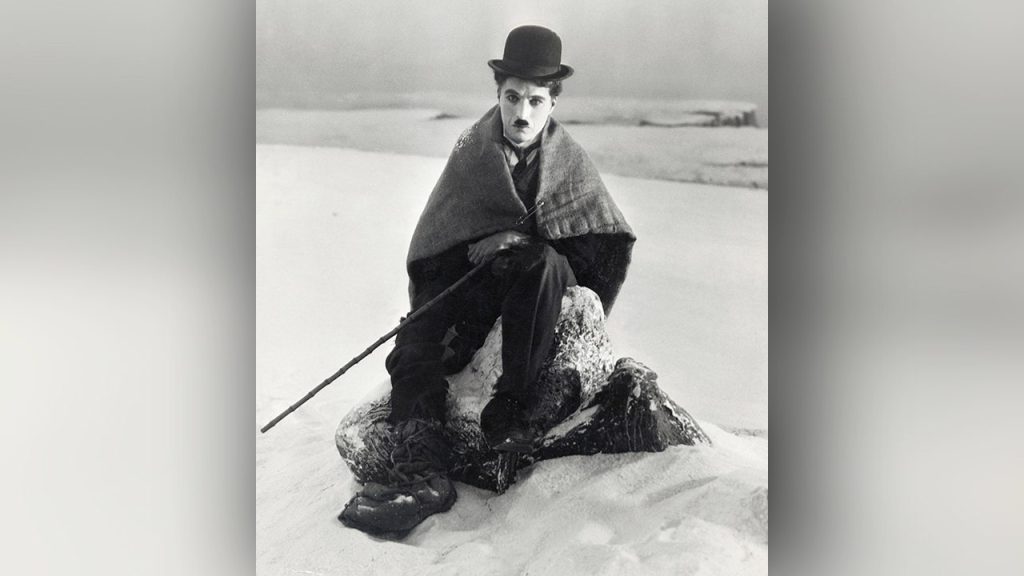Charlie Chaplin, born on April 16, 1889, in London, England, would go on to become one of the most financially successful stars of early Hollywood. At the tender age of five, he was introduced to the stage as the son of London music hall entertainers. His father passed away when he was young, and his mother suffered a nervous breakdown, leading Chaplin and his older half-brother, Sydney, to take to the streets of London to earn pennies for their dancing. Eventually, they were sent to an orphanage where they joined the Eight Lancashire Lads, a children’s dance troupe. Chaplin quickly attracted attention as an outstanding tap dancer and began his career as a comedian in vaudeville.
He traveled to the U.S. in 1910 as a featured player with the Fred Karno Company and soon began working on both sides of the camera, directing his own films. He perfected the character Charlie the Tramp, which became his trademark, and signed on with various companies, steadily increasing his salary and success. Chaplin founded the United Artists Corporation in 1919 with Mary Pickford, Douglas Fairbanks, and D.W. Griffith. He was known as a masterful silent film actor and pantomimist, eliciting both laughter and tears from his audiences. Despite resisting the arrival of sound in movies, he eventually incorporated music into his films, composing the entire score for “City Lights” in 1931.
Chaplin lived in the United States for over 40 years but never became a U.S. citizen, despite his immense impact on the film industry. He faced accusations of communist ties, which he denied, and in 1952, immigration officials prevented him and his wife from reentering the United States after a foreign tour. They settled in Switzerland with their eight children. In 1972, Chaplin returned to America to accept a special Academy Award for his contributions to making motion pictures an art form of the century. Actress Sophia Loren reflected on working with Chaplin on his last film, “The Countess from Hong Kong,” describing both his nervousness and mastery on set. Chaplin was knighted in 1975 and passed away at age 88 on Christmas day in 1977, leaving behind a lasting legacy in Hollywood.
Chaplin’s influence on the film industry is undeniable, as he revolutionized the world of silent film and storytelling through physical comedy and emotive performances. His ability to connect with audiences through humor and pathos made him a beloved figure in Hollywood history. Despite facing challenges and controversy throughout his career, Chaplin’s dedication to his craft and his impact on cinema remain unparalleled. His contributions to the art of filmmaking have solidified his place as a legendary figure in the entertainment industry. Chaplin’s work continues to inspire and entertain audiences worldwide, showcasing the timeless appeal of his iconic characters and storytelling techniques.
Through his unparalleled talent, Charlie Chaplin left an indelible mark on the film industry, revolutionizing the way stories were told on screen. His dedication to his craft and ability to evoke both laughter and tears from audiences set him apart as a true master of his art. Despite facing challenges and controversies in his personal and professional life, Chaplin’s legacy endures as a testament to his impact on cinema. His creations, such as the character Charlie the Tramp, continue to resonate with audiences around the world, showcasing the timeless appeal of his work. As a pioneer in the world of silent film and an innovator in storytelling, Chaplin’s influence on the industry remains unmatched.
From his early beginnings as a child performer in London to his rise to stardom in Hollywood, Chaplin’s journey is a testament to the power of perseverance and dedication. His ability to connect with audiences through humor and emotion transcended language barriers and cultural divides, making him a global icon. Despite the challenges he faced in his personal life and career, Chaplin’s passion for his craft never wavered. His impact on the film industry, as well as his lasting legacy in Hollywood, cement his status as one of the greatest entertainers of all time. The timeless appeal of his work continues to captivate audiences, showcasing Chaplin’s enduring influence on the world of cinema.
In conclusion, Charlie Chaplin’s remarkable career and lasting impact on the film industry serve as a testament to his legendary status in Hollywood history. From his early beginnings as a child performer to his rise to stardom as a silent film actor and director, Chaplin’s contributions to the art of cinema are undeniable. His ability to evoke laughter and tears from audiences, as well as his dedication to storytelling and character development, set him apart as a true master of his craft. Despite facing challenges and controversies throughout his life, Chaplin’s legacy endures as a symbol of cinematic excellence and artistic innovation. Through his iconic characters and timeless films, Chaplin continues to entertain and inspire audiences around the world, solidifying his place as one of the greatest entertainers of all time.


